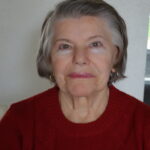
Mariya Nayshtut (Ukraine)
I was born in Kiev, Ukraine, on May 31, 1940. My mother was a pharmacist and my father worked as a polisher in a military factory. Before the war, my family consisted of four people: my father, Motel Yankelevich Perel; my mother, Cherna Yankelevna Perel; my older brother, Yankel Motelevich Perel; and me. My mother had five sisters and six brothers. All of her brothers and her older sister were killed during the war. My father had one brother and one sister who remained in Kiev. I was one year old when the war began, so what I’m writing is what I recall from my parents.
The Germans acted out against Jews immediately after occupying Kiev. Jews were taken to Babi Yar in large groups, where they were executed. My uncle’s family was among them. At Babi Yar, where the fascists stood people near ditches to shoot them, my uncle’s son, Iosef, stood next to his father, waiting. But when the shots began, he and another boy simply fell into the ditch on top of the dead bodies. After the executions, the ditch was filled in, but by some miracle the boys managed to dig their way out and run into the woods, where partisans found them. That’s how my cousin survived.
At one point a message arrived regarding my mother’s brother, Isaak, who was a tank crewman. He blew up his own tank rather than surrender it to the Germans. I must repeat: all six of my mother’s brothers were killed in the war.
Immediately after the war began, the factory where my father worked was to be evacuated to Kuybyshev by order of the government. Before that, as my father worked one night, several people knocked on our door and asked my mother “Do Jews live here?” My mother said yes, and asked what they wanted. A man said they’d return the following day to kill us. This was the state of anti-Semitism in Ukraine. That night, my father said we should gather our things as quickly as possible, as there was a train at the station for factory personnel headed to Kuybyshev.
As my parents explained it, my mother carried me in her arms, my five-year-old brother carried two packages, and my father balanced a child’s washtub on his head with luggage in both hands. We left the city at night, loaded onto a train, and departed.
The factories were transferred to outlying villages near Kuybyshev. My father worked in the large military factory, two or three shifts at a time without a break. My mother worked in a factory as well. It was very cold, and there was no food. My mother had a daughter in 1943. We had nothing to eat, and the children went hungry.
My father sometimes brought vodka home from the factory, which my mother traded for bread and soup. One time she dug up several potatoes from a field, but a guard saw her and told her to leave or they’d turn her over to a military tribunal, meaning she’d be shot on the spot.
We returned to Kiev in 1946, but our apartment was occupied by some sort of higher up and we couldn’t get it back. My parents decided to go to Lvov, Ukraine, since three of my mother’s sisters lived there. Our family of five received a room in Lvov that was 9.5 square meters (102 square feet). We lived in this room for 14 years.
I graduated school in Lvov in 1958 and went to work in a military factory, where I worked as an operator in the computer center for 37 years. I retired when I was 55.
There has always been anti-Semitism in Western Ukraine, with its center in Lvov, and for many years it will be a breeding ground for anti-Semitism. I always had to remember that I was Jewish in the factory, and had to work better than my colleagues. This meant never being late, never leaving work early, maintaining quality work, and behaving.
My husband and I moved to America in December 1997. We are very lucky to live in this country.
